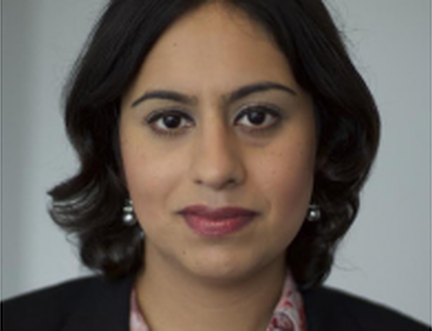More articles Monday 29 August 2016 1:45pm
Sara Khan Demands a Stronger Response to Radicalisation

With the issue of radicalisation among young Muslims perpetually surfacing in the news, and proposed solutions causing controversy on the basis of divisiveness and implicit Islamophobia, Sara Khan operates in treacherous territory. The director of the counter-extremist organisation Inspire and the author of the book The Battle for British Islam is unsparing in her account of how extreme positions on Islam are fostered – not only on the internet, and not only by racist and intolerant treatment, but within certain Muslim groups and communities themselves.
“There’s a very deliberate attempt by Islamist groups in this country to promote a victimhood narrative,” she told her audience at the Book Festival. She acknowledged that “the whipping up of fear and the emphasis on the otherness of Muslims” prevalent in the British media since 9/11 was a factor in the rise of extremist ideologies, but squarely blamed certain hardline Muslim organisations and preachers for building on that propaganda themselves.
“They peddle the idea that you can’t belong here; that you should be dreaming of a caliphate. Culture is seen to be bad. Diversity is seen as a bad thing… The irony is that if you look at the history of Islam, it spread across the world by embracing other cultures.” Khan rejected as a damaging fiction the idea that a more extreme, puritanical Islam is a truer one. “A superficial understanding makes people more vulnerable to radicalisation,” she said. “No-one’s really teaching young people a good, in-depth knowledge of Islam.” That vacuum, she said, represents an opportunity for radicalisers and recruiters – and not enough resistance is being presented from within the Muslim community itself. “There is no strong Muslim leadership in this country. A lot of Muslims don’t want to accept that, but that’s the reality.”
Ironically, she said, extremist elements in Islam and the white supremacist far right fear the same thing: the successful establishment of a British Islam. She cited London Mayor Sadiq Khan as both groups’ worst nightmare: “He destroys that victimhood idea; he destroys the idea that Muslims can’t do well in this society.” Khan cited the Bradford Council of Mosques’ recent demand for new blasphemy laws, in response to the murder of Asad Shah, as evidence of “going backwards” - they last raised the notion in 1989 with reference to the fatwa against Salman Rushdie. She criticises as “oversensitivity” the fact that Universities UK recently entered a controversy regarding gender segregation in university lectures, instead of banning it outright.
“Let’s get over this idea of offence,” she said, “and think about what’s best for children in this country. Freedom of speech is something we should defend at all costs.” Khan acknowledged that her forthrightness on these matters is challenging to some at a time when cultural difference is a fraught topic, but emphasised its necessity. “One of the biggest issues that has impacted on Muslim communities is people not pushing boundaries,” she said. “I don’t expect everyone to agree with my views, but you need people who will push things.”
She is committed to working with educators and communities to expand communication and understanding, to defeat negative narratives and to reduce the risk of radicalisation. “We as a society have a responsibility to counter those radical views. We have to educate parents. We have to engage with young people. We have to develop critical thinking.” And despite the depth of divisions, she remains positive: “I wouldn’t do what I do if I didn’t think change was possible. I fully believe we can change the argument.”

 Major new partnership with Celtic Connections
Major new partnership with Celtic Connections 

